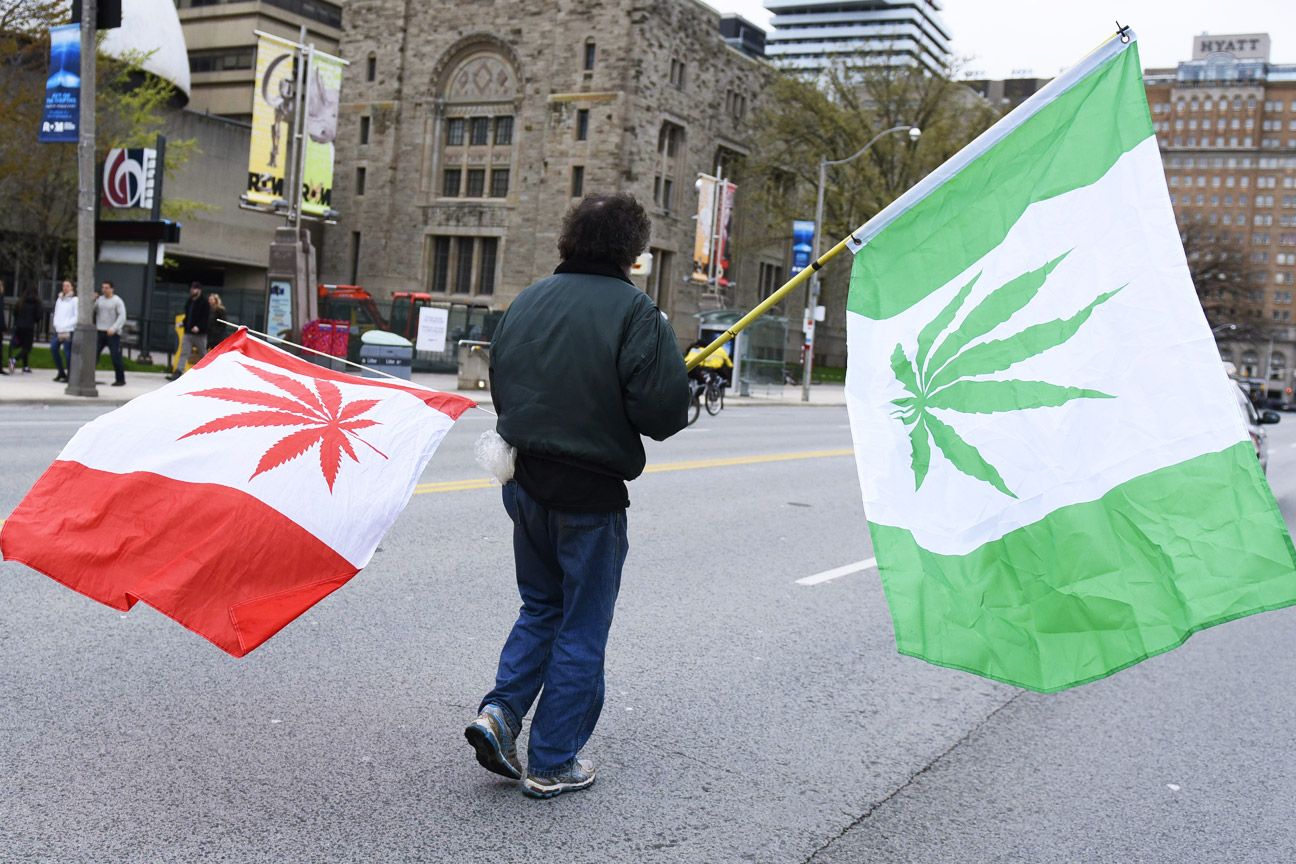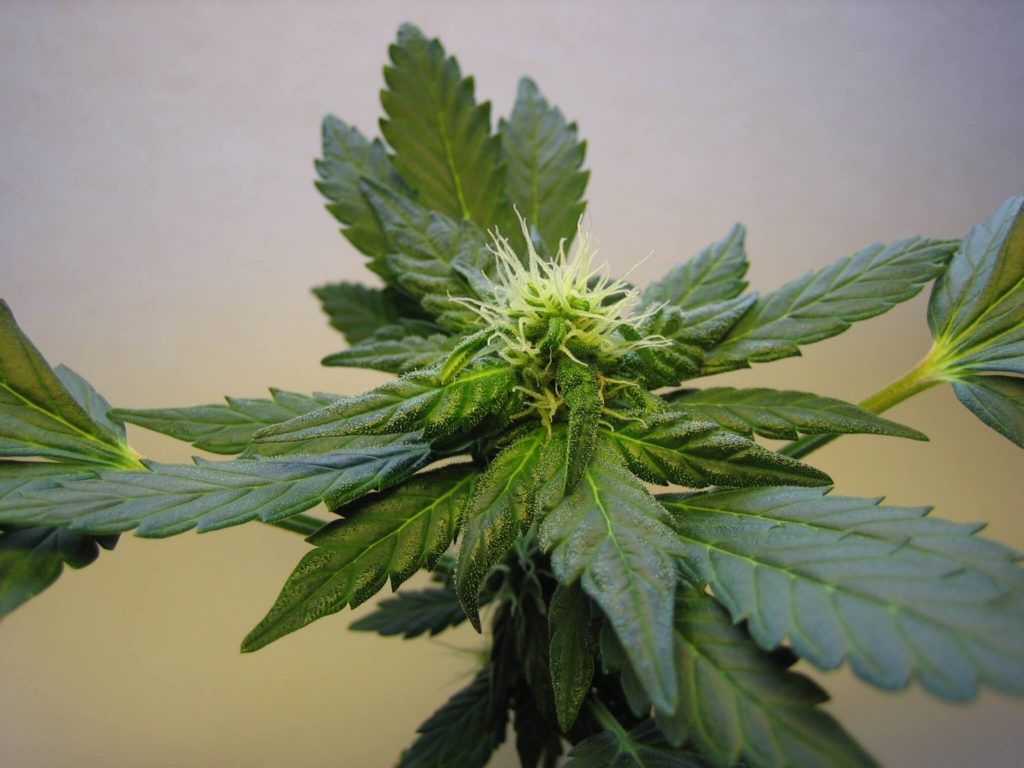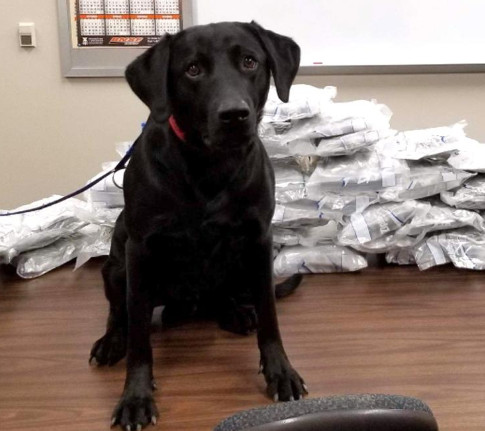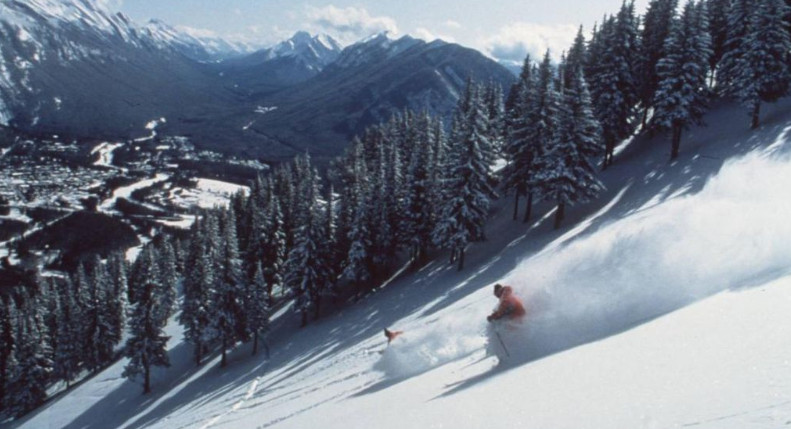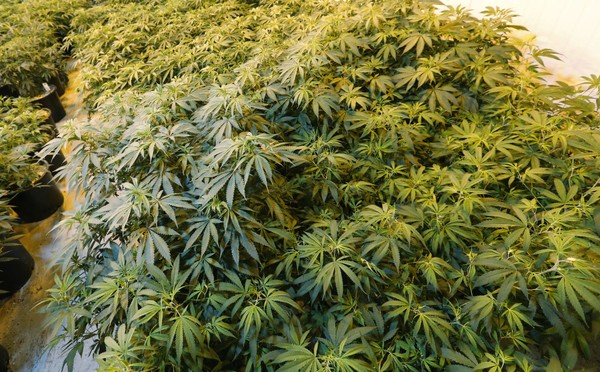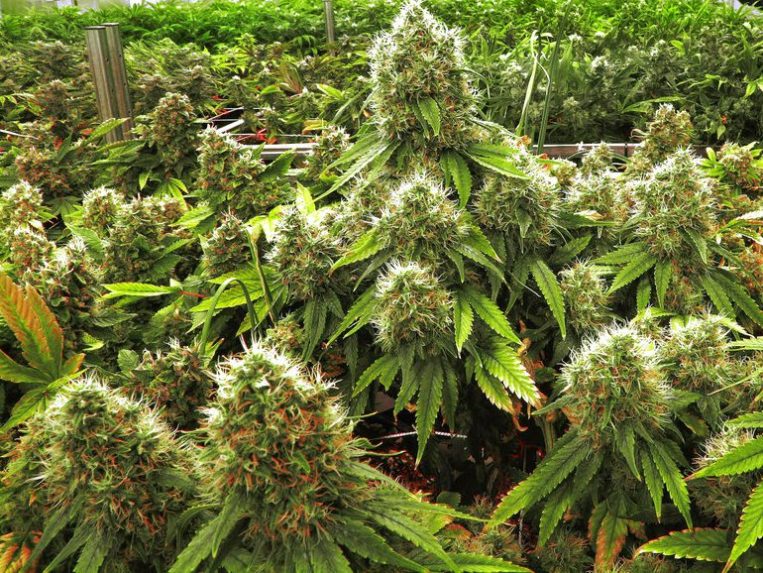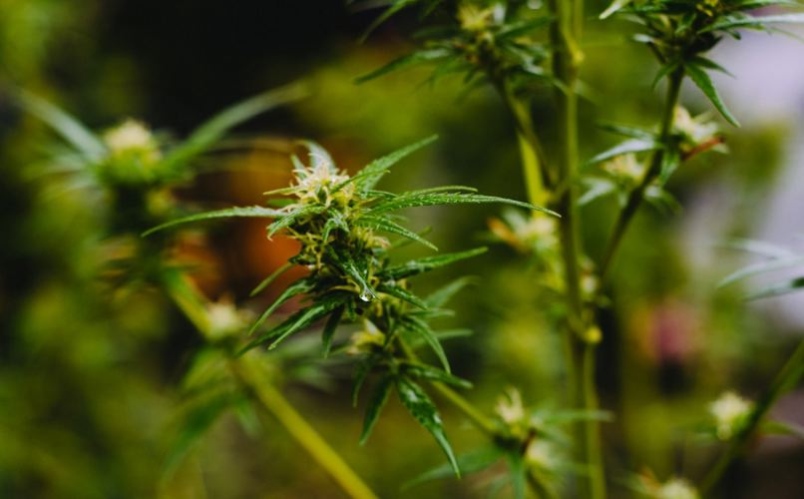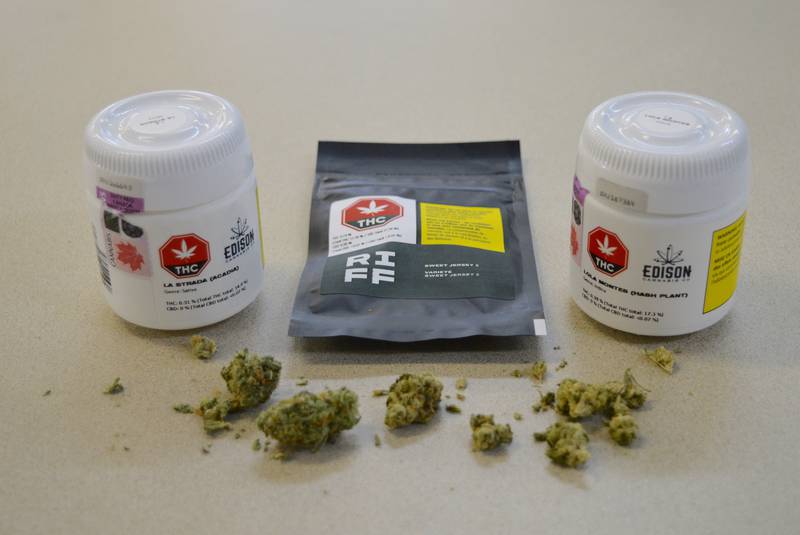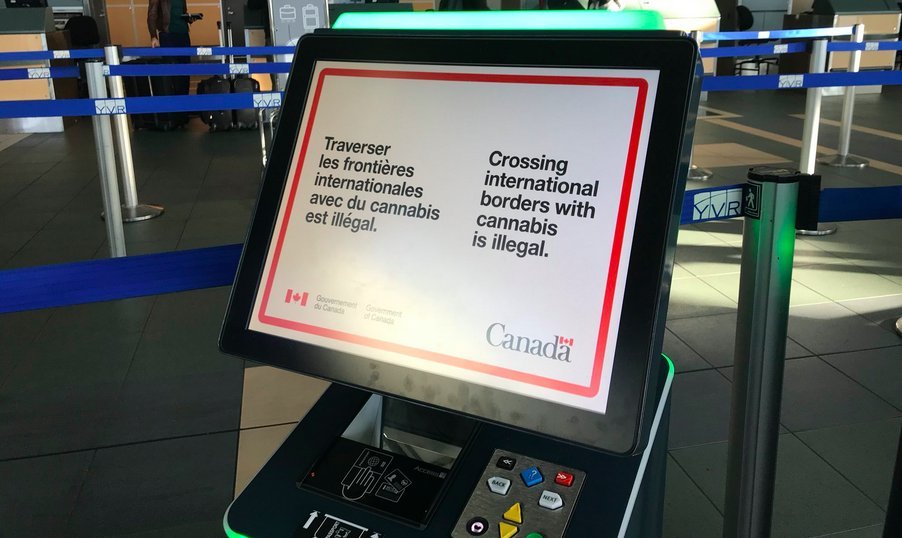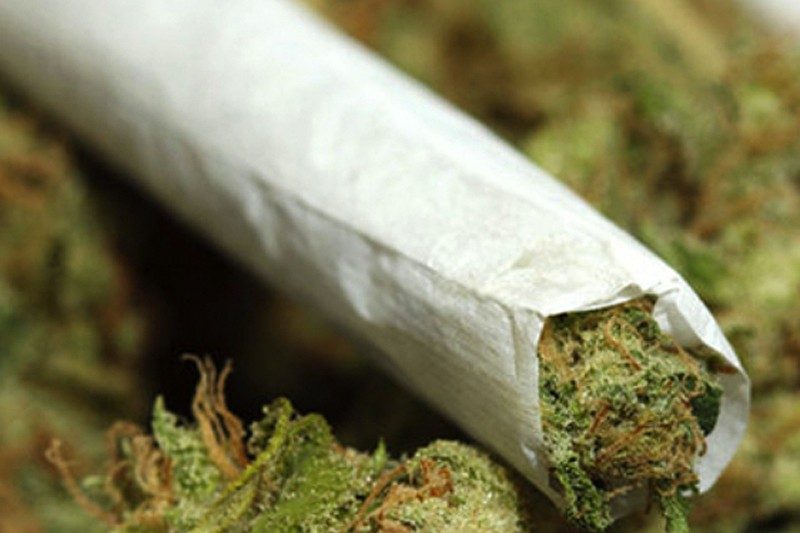October 17th marks a historic moment for Canada and the world as it becomes the second-ever country, after Uruguay, to federally legalize and regulate adult-use cannabis. As Canadian Seth Rogen told Stephen Colbert after the law first passed, it was “the reasonable thing to do.”
Although there’s under 200 shops peddling herb for non-patients as of today and the associated laws are more complicated and numerous than ever before, Canadians are rejoicing — and shopping. Owner of Portugal Cove, Newfoundland shop THC Distribution, Thomas Clarke, told reporters he moved about 572 grams between midnight and 2 a.m. this morning — that’s close to 1330 joints, according to one federal study. Clarke’s own father was among some of the early customers. Other locals, like Cape Breton fiddle player Ashley MacIsaac, camped overnight to wait for collectives to open. Around midnight, Montreal-based actor Jay Baruchel tweeted, “HOLY SHIT IT ACTUALLY HAPPENED!!!”
As ebullient hashtags like #canadacannabis and #legalizedit have flooded social media, the country itself has been gearing up for today, rolling out public service announcements to prep its citizens. Don’t Drive High is a pretty self-explanatory campaign, warning cannabis consumers to never get behind the wheel shortly after ingesting, with the slogan “Your life can change in an instant.” Yet Bill C-46, the Canadian law around driving and cannabis, remains somewhat opaque. If law enforcement finds between two and five nanograms of THC (the psychoactive cannabinoid found in weed) in someone’s blood, that driver could get slapped with a fine of up to $1,000. Many Canadians dispute that parameter, since the amount of ganja it takes to get a person stoned — and the time that THC stays in a person’s system — can fluctuate dramatically depending on frequency of use. As cannabis-investing private equity firm Nesta Holding Co. employee Chuck Rifici has pointed out: “If you enjoy cannabis… on a Friday night, you shouldn’t be worried on Monday morning, when you are completely, 100 percent not impaired.” There is not yet a protocol to measure blood THC levels in a more immediate sense.
Similarly, the government of Canada has been pushing a campaign to caution Canadians against trying to cross international borders; entering Canada with cannabis is similarly illegal (despite what some might deduce from Los Angeles airport LAX’s new parameters). However, it’s legal for Canadians to travel around their own country with up to 30 grams.
Generally, like much of the States with flexible green laws, cannabis consumption in Canada is confined to private residences. In Ontario, British Columbia, and Alberta, aside from Calgary, people will be able to smoke weed where they can smoke cigarettes. In Ontario, that means streets as well as parks, but in British Columbia, smoking isn’t allowed in parks or on community beaches. Halifax offers specifically weed-friendly zones in which denizens may spark up. Parks Canada announced an exciting loophole for stoners who prefer a high with a view: cannabis consumption at Parks Canada campsites is legal, citing that individual sites double as “temporary domiciles for our visitors.”
Despite the fact that Canadians can’t simply pick up a couple pre-rolls just anywhere — herb must come from a government-run dispensary or delivery services necessitating age verification — weed dealers aren’t worried about legalization greatly hurting business. With the government shuttering illegal storefronts, that means less competition for the black market. “I’ve never really had to worry and I’m not worried now,” a long-time, smaller size peddler told The Guardian. Just as legalization only extends to dried herb and concentrates, that leaves companies selling cannabis-infused foods and drinks out in the cold. Edibles are illegal, unless made at home by a consumer for personal use. (Sale of hemp foods and drinks remain legal, though.)
Additionally, regulated cannabis in general has lower THC content. That latter phenomenon, against popular belief, isn’t a byproduct of Canada’s government-mandated irradiation process, a sterilization method used on other crops such as potatoes and spices. The World Health Organization has also deemed the practice, which has been practiced for 50 years, safe. Some studies show irradiation does slightly change the plant’s terpenes — the aromatic oils in cannabis that guide subtleties in the strain’s physical and mental effects — but never enough to completely, qualitatively restructure the terpene profile. Overall, irradiation persists as one of the most recommended ways to decontaminate cannabis. This kind of consideration is especially important when doctors prescribe cannabis to patients with weak immune systems; a microbial infection could be really dangerous.
Aditionally, there’s another positive change taking shape. On Wednesday, the country is slated to announce an effort to pardon cannabis possession charges. Unfortunately, that effort towards clemency won’t take effect immediately. Many aspects of the national legalization are expected to move at a snail’s pace, too, including an onslaught of regulated brick-and-mortars in some of Canada’s most populated cities, like Toronto. Some edibles distributors are taking advantage of the government’s sloth pacing. Canada-based Mary’s Medibles, which sells edibles among other cannabinoid-spiked fare, tweeted, “We are waiting to see what moves the government makes. We don’t anticipate full shut down and are making moves to work with them in whatever format they decide is the new framework.”
“Cannabis-wise here in Ontario, the 17th will be somewhat anticlimactic [in Toronto] as there are no brick-and-mortar stores open until April,” Marly Tweedledoob, a Toronto-based cannabis photographer and social media influencer, tells Rolling Stone, “so people can order online as of [today] but they won’t receive it same day.” (A few stores will be open as of Wednesday, though it depends on the province.)
Alanna, a 34-year-old living in Nova Scotia, tells Rolling Stone she hasn’t seen too much mania just yet. “Media here were shocked that people weren’t lined up. We had to remind them that pot users are not ones to line up for an item we can already access easily.” She preferred to not disclose more identifying information as she waits on her company to release its cannabis usage policy, a right private businesses are still entitled to. Alanna stressed the prevalence of medical cannabis cards in the country, where that’s been legal since 2001. “It’s been hilarious to watch it unroll.… The heavier users I know are definitely excited that there’s a place to get [cannabis] that is regulated so you know exactly what you’re getting. But it’s been so prevalent in our social circles that it’s not thrilling.
Credit: www.rollingstone.com

